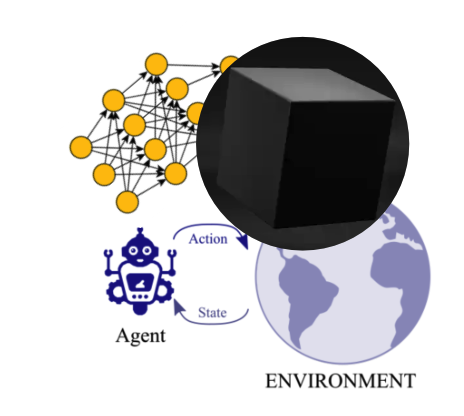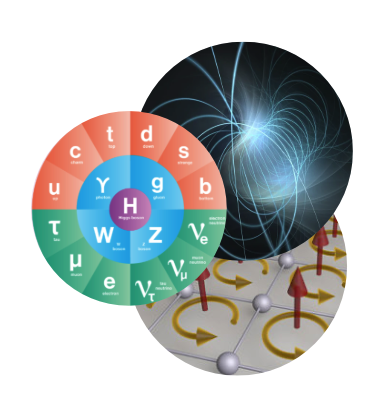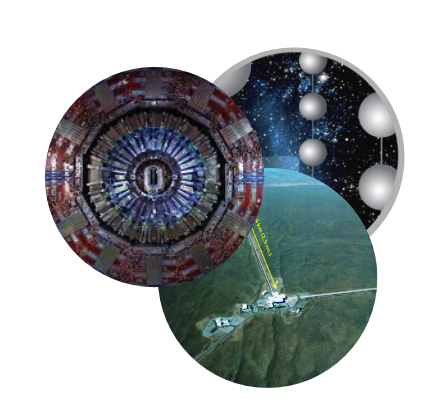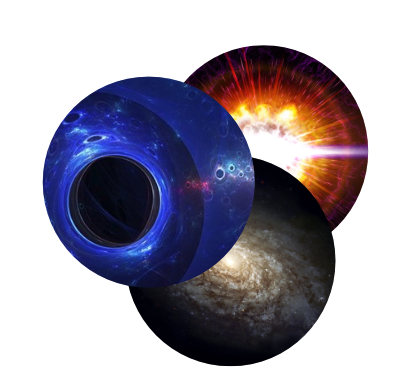Foundational AI
 Infusing physics principles into AI to create state-of-the-art AI innovations, including:
Infusing physics principles into AI to create state-of-the-art AI innovations, including:
- representation learning,
- robust and interpretable AI, and
- reinforcement learning.
Projects in Foundational AI are infusing physics principles into AI to create state-of-the-art AI innovations, particularly in terms of representation learning, robust/interpretable AI, and reinforcement learning. Overall, the goal for projects in this domain is to develop AI techniques that can be used across a variety of applications and that are influenced by physics principles and/or problems. Researchers are tackling AI questions dealing with robustness, interpretability, computer vision, equivariance, and segmentation, among others.
Research Highlights
L2M: Mutual Information Scaling Law for Long-Context Language Modeling
Zhuo Chen, Oriol Mayné i Comas, Zhuotao Jin, Di Luo, Marin Soljacic
AutoSciDACT: Automated Scientific Discovery through Contrastive Embedding and Hypothesis Testing
Samuel Bright-Thonney, Christina Reissel, Gaia Grosso, Nathaniel Woodward, Katya Govorkova, Andrzej Novak, Sang Eon Park, Eric Moreno, Philip Harris
Remove Symmetries to Control Model Expressivity and Improve Optimization
Liu Ziyin (MIT/NTT Research/IAIFI), Yizhou Xu (EPFL), Isaac Chuang (MIT/IAIFI)
LEAPS: A discrete neural sampler via locally equivariant networks
Peter Holderrieth (MIT), Michael S. Albergo (IAIFI), Tommi Jaakkola (MIT/IAIFI)
Denoising Hamiltonian Network for Physical Reasoning
Congyue Deng (MIT/Stanford, Incoming IAIFI Junior Investigator), Brandon Y. Feng (MIT/IAIFI), Cecilia Garraffo (Harvard/IAIFI), Alan Garbarz (Universidad de Buenos Aires and Instituto de Física de Buenos Aires), Robin Walters (Northeastern/IAIFI), William T. Freeman (MIT/IAIFI), Leonidas Guibas (Stanford), Kaiming He (MIT/IAIFI)
Reinforcement Learning for Optimal Control of Adaptive Cell Populations
Josiah C. Kratz (Carnegie Mellon University), Jacob Adamczyk (UMass Boston/IAIFI)
QuanTA: Efficient High-Rank Fine-Tuning of LLMs with Quantum-Informed Tensor Adaptation
Zhuo Chen, Rumen Dangovski, Charlotte Loh, Owen Dugan, Di Luo, Marin Soljačić (MIT/IAIFI)
KAN: Kolmogorov-Arnold Networks
IAIFI: Ziming Liu, Fabian Ruehle, James Halverson, Marin Soljačić, Max Tegmark; Collaborators: Yixuan Wang, Sachin Vaidya, Thomas Y. Hou
Symphony: Symmetry-Equivariant Point-Centered Spherical Harmonics for Molecule Generation
Ameya Daigavane, Song Eun Kim, Mario Geiger, Tess Smidt (MIT)
Distilled Feature Fields Enable Few-Shot Language-Guided Manipulation
Ge Yang (IAIFI Fellow), William Shen, Alan Yu, Jansen Wong, Leslie Pack Kaelbling, Phillip Isola (MIT)
Dynamic Sparse Training
Mike Lasby, Anna Golubeva, Utku Evci, Mihai Nica, Yani A. Ioannou
Learning Athletic, Context-Adaptive Robot Locomotion
Pulkit Agrawal, Gabriel B Margolis, Yandong Ji (MIT)
An Effective Theory of Representation Learning
Ziming Liu, Ouail Kitouni, Niklas Nolte, Eric J. Michaud, Max Tegmark, Mike Williams (MIT, IAIFI)
Theoretical Physics
 Research in Physics Theory is leveraging AI to understand the theoretical underpinning of fundamental physics, including:
Research in Physics Theory is leveraging AI to understand the theoretical underpinning of fundamental physics, including:
- nuclear/particle physics,
- quantum field theory and string theory, and
- quantum many-body physics.
Projects in AI for Theoretical Physics utilize AI tools and techniques to enable physics discovery through the acceleration of theoretical physics calculations. In turn, the advances made in this domain also contribute to advancing AI—researchers are not simply using existing AI tools and techniques as they are, but are building on those tools and developing new tools, which can have applications beyond AI. Researchers working in this domain are developing AI to solve problems related to the detection of subhalos, quantum many-body physics, simulation-based inference, lattice quantum field theory, dark matter searches, and knot theory, to name a few.
Research Highlights
Generative Modeling for Mathematical Discovery
Jordan S. Ellenberg (University of Wisconsin-Madison), Cristofero S. Fraser-Taliente (University of Oxford), Thomas R. Harvey (IAIFI Fellow), Karan Srivastava (University of Wisconsin-Madison), Andrew V. Sutherland (MIT)
Learning the Simplicity of Scattering Amplitudes
Matthew D. Schwartz, Aurelian Dersy (Harvard/IAIFI) and Clifford Cheung (Caltech)
SHAPER: Can You Hear the Shape of a Jet?
Demba Ba (Harvard, IAIFI), Akshunna S. Dogra (Imperial College London, Harvard, IAIFI), Rikab Gambhir (MIT, IAIFI), Abiy Tasissa (Tufts), Jesse Thaler (MIT, IAIFI)
Infinite Neural Network Quantum States
Di Luo (IAIFI Fellow), James Halverson (Northeastern)
Normalizing Flows for Lattice Quantum Field Theory
Phiala Shanahan, Dan Hackett, Fernando Romero-Lopez, Julian Urban (MIT/IAIFI), Denis Boyda (incoming IAIFI fellow), Ryan Abbott (MIT), Kyle Cranmer (NYU), Michael Albergo (NYU), Danilo Rezende (Google DeepMind), Sebastien Racaniere (Google DeepMind)
Experimental Physics
 Enhancing the operations and analysis of flagship NSF experiments through AI, including the:
Enhancing the operations and analysis of flagship NSF experiments through AI, including the:
- Large Hadron Collider,
- IceCube Neutrino Observatory, and
- Laser Interferometer Gravitational Wave Observatory.
The impacts of IAIFI on many experiments aim to exploit AI developments to enhance the quality of physics that can be performed. Data from physics experiments can significantly benefit from the application of AI algorithms leading to better physics measurements and, ultimately, a deeper understanding of the universe. The use of experimental data additionally provides a real-world, often noisy, setting to verify AI methods. Our efforts in AI for experiment are symbiotic with our work to advance the field of AI itself and allow for the rapid deployment of novel ideas to core physics measurements.
Research Highlights
Enhancing events in neutrino telescopes through deep-learning-driven superresolution
Felix J. Yu (Harvard/IAIFI), Nicholas Kamp (Harvard/IAIFI), Carlos A. Argüelles (Harvard/IAIFI)
Towards Universal Unfolding of Detector Effects in High-Energy Physics using Denoising Diffusion Probabilistic Models
Camila Pazos (Tufts/IAIFI), Shuchin Aeron (Tufts/IAIFI), Pierre-Hugues Beauchemin (Tufts/IAIFI), Vincent Croft, Zhengyan Huan (Tufts), Martin Klassen, Taritree Wongjirad (Tufts/IAIFI)
From Neurons to Neutrons: A Case Study in Interpretability
Ouail Kitouni (MIT/IAIFI), Niklas Nolte (MIT/IAIFI), Vı́ctor Samuel Pérez-Dı́az (Harvard/IAIFI), Sokratis Trifinopoulos (MIT/IAIFI), Mike Williams (MIT/IAIFI)
Anomaly-aware summary statistic from data batches
Gaia Grosso (IAIFI Fellow)
Using Machine Learning for Neutrino Detection
IceCube Collaboration (Jessie Micallef, IAIFI Fellow)
Model-agnostic search for dijet resonances with anomalous jet substructure in proton-proton collisions at √s = 13TeV
Phil Harris, Patrick McCormack, Sang Eon Park (MIT), Sam Bright-Thonney (incoming Fellow), part of CERN CMS collaboration
Improving the performance of the Laser Interferometer Gravitational-wave Observatory (LIGO) with AI
Lisa Barsotti, Nikhil Mukund, Chris Whittle, Matt Evans, Pulkit Agrawal, (MIT) Ge Yang (IAIFI Fellow)
Robust AI for Real-Time Applications
Ouail Kitouni, Niklas Nolte, Blaise Delaney, Mike Williams (MIT, IAIFI)
Astrophysics
 Using AI techniques to understand the universe on cosmological scales, including:
Using AI techniques to understand the universe on cosmological scales, including:
- dark matter searches,
- structure formation, and
- multi-messenger astrophysics.
The research in Astrophysics is contributing to a variety of subfields, including dark matter searches, large-scale structure of the universe, and galaxy formation. The use of AI is becoming increasingly pervasive in astrophysics, and IAIFI researchers are at the cutting edge of developing techniques for applications ranging from image classification to data interpretation to anomaly detection.
Research Highlights
Detecting model misspecification in cosmology with scale-dependent normalizing flows
Aizhan Akhmetzhanova, Carolina Cuesta-Lazaro, Siddharth Mishra-Sharma
Evidence for an Instability-induced Binary Merger in the Double-peaked, Helium-rich Type IIn Supernova 2023zkd
Alex Gagliano (IAIFI), Ashley Villar (IAIFI/Harvard), T. Matsumoto (Kyoto University), D. O. Jones(University of Hawai’i), C.L.Ransome (Harvard), A.E.Nugent (Harvard), Daichi Hiramatsu (IAIFI/Harvard), and the Young Supernova Experiment
A Cosmic-Scale Benchmark for Symmetry-Preserving Data Processing
Julia Balla (MIT/IAIFI), Siddharth Mishra-Sharma (Former IAIFI Fellow), Carolina Cuesta-Lazaro (IAIFI Fellow), Tommi Jaakkola (MIT/IAIFI), Tess Smidt (MIT/IAIFI)
Maven: A Multimodal Foundation Model for Supernova Science
Alexander T. Gagliano, Siddharth Mishra-Sharma (IAIFI Fellows), V. Ashley Villar, Gemma Zhang (Harvard), Thomas Helfer (Stony Brook)
A point cloud approach to generative modeling for galaxy surveys at the field level
Carolina Cuesta-Lazaro, Siddharth Mishra-Sharma (IAIFI Fellows)
Cosmological Data Compression and Inference with Self-Supervised Machine Learning
Aizhan Akhmetzhanova (Harvard), Siddharth Mishra-Sharma (IAIFI Fellow), Cora Dvorkin (Harvard)
Uncovering dark matter density profiles in dwarf galaxies with graph neural networks
Tri Nguyen (MIT), Siddharth Mishra-Sharma (IAIFI Fellow), Lina Necib (MIT)
Strong Lensing Source Reconstruction
Siddharth Mishra-Sharma, Ge Yang (IAIFI Fellows)